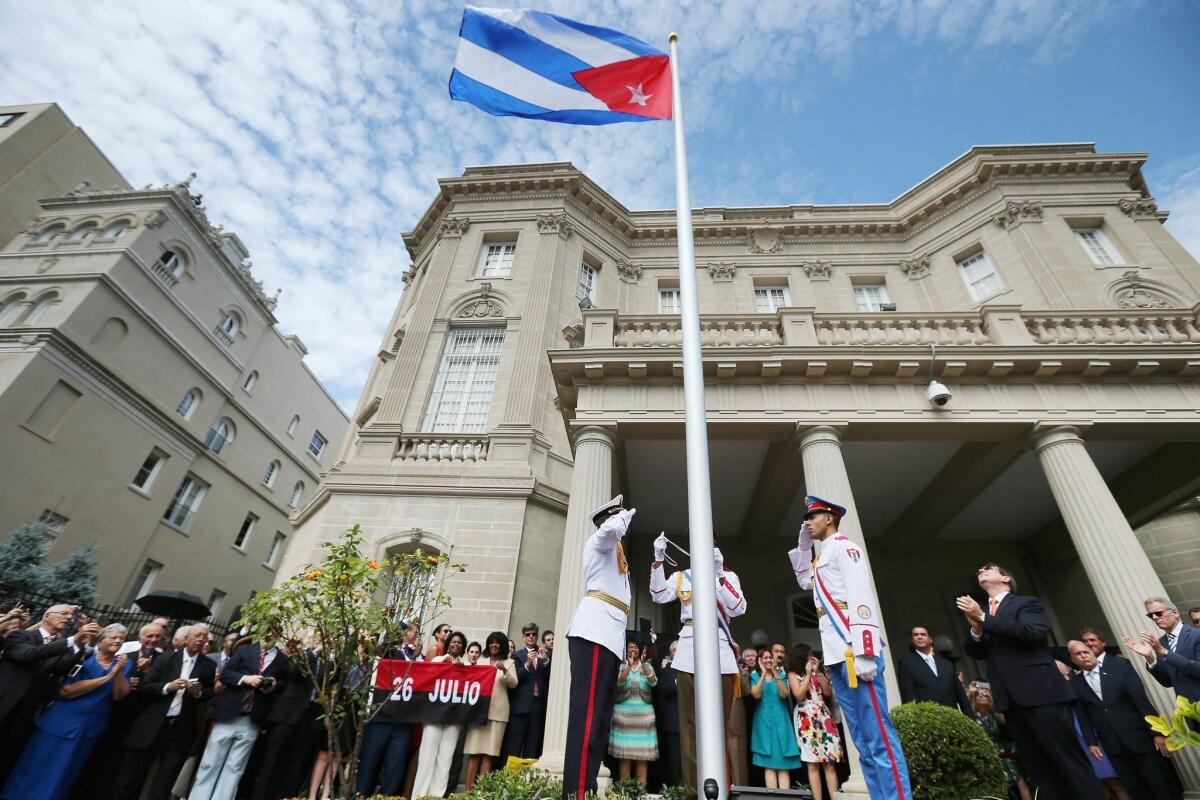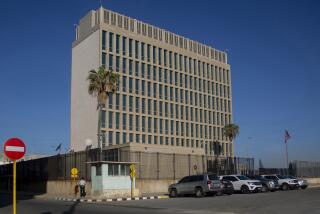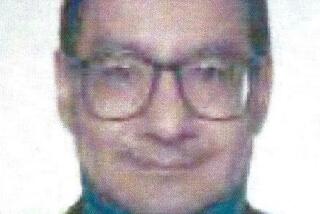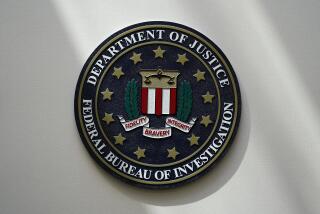John Kerry makes a historic visit to Cuba that will be more symbolism than substance

Cuban Foreign Minister Bruno Rodriguez applauds as the Cuban flag is raised in front of the country’s embassy in Washington on July 20, 2015.
No U.S. secretary of State has visited Havana since Edward R. Stettinius Jr. stopped by for a day in March 1945 to show American support for a short-lived democratic government.
John F. Kerry will end that long absence Friday when he flies to the Cuban capital to raise the U.S. flag for the first time in 54 years at the newly reopened U.S. Embassy, giving another push to efforts to normalize ties between the former Cold War foes.
In an interview Wednesday with Telemundo, the U.S.-based Spanish-language network, Kerry said he also intends to try his hand at personal diplomacy by taking a stroll in Old Havana, “meeting whoever I meet and listening to them and having, you know, whatever views come at me.”
NEWSLETTER: Get the day’s top headlines from Times Editor Davan Maharaj >>
The U.S. and Cuba officially restored diplomatic relations July 20, as part of the normalization initiative President Obama and his Cuban counterpart, Raul Castro, announced in December. So Kerry’s trip is more about symbolism than substance.
But the images from Kerry’s walkabout and other interactions are vital to the Obama administration and advocates for normalization, who want to build public support and maintain momentum toward better relations between Washington and Havana.
Kerry will help raise the Stars and Stripes at the embassy before an audience that includes three long-retired Marines who lowered the last U.S. flag there Jan. 3, 1961, when President Eisenhower cut diplomatic relations with the new communist government under Castro’s brother, Fidel.
Some lawmakers, entrepreneurs and Cuban American activists clamored for a chance to fly down with Kerry and his official delegation. The administration is accommodating a planeload of them, as well as an ample crowd of journalists, to give the event maximum visibility.
Yet the one-day visit to Havana poses a challenge for Kerry. He needs to stand up for human rights and other American values without alienating a Cuban government that fears Washington want to upend the current order, said Carl Meacham, a Latin America specialist at the nonpartisan Center for Strategic and International Studies in Washington.
“This is a tall order,” Meacham said. “If he’s not seen as pushing hard for American principles, the U.S. will be viewed as not strong, but accommodationist.”
Cuban Foreign Minister Bruno Rodriguez is scheduled to hold a joint news conference with Kerry, as he did last month in Washington after the Cuban Embassy reopened. Kerry is not expected to meet with Raul or Fidel Castro, who turned 89 Thursday.
Congressional critics, who see normalization as appeasement of the repressive Castro government, point to a reported surge in arrests of Cuban political dissidents this year. About 90 activists, including some who oppose the resumption of diplomatic relations, were held briefly over the weekend.
Kerry’s “presence in Havana on his global capitulation tour is yet another example of the Obama administration’s desire to pursue deals at any cost,” Rep. Ileana Ros-Lehtinen (R-Fla.), an opponent of normalization, said in a statement Thursday. “While the Castro brothers will roll out the red carpet for Secretary Kerry, the people of Cuba will continue to be met with violence and detentions.”
How closely the Obama administration publicly embraces Cuban dissidents is a delicate issue, however. Cuba’s government views such contacts as subversive and won’t take part in events where they are present.
U.S. officials say they are determined to push on human rights, including economic freedoms, but they don’t want to undermine cooperation on other important issues, including counter-terrorism, drug smuggling and trade.
No dissidents were invited to the formal flag-raising ceremony at the embassy, which is technically a “government-to-government” event, according to a State Department official who briefed reporters on condition of anonymity in discussing Kerry’s plans. The official said the area for the event doesn’t have much space.
But dissidents and other members of Cuba’s “civil society” are expected at a much larger gathering that Kerry will host later in the day at the residence of the U.S. chief of mission, Jeffrey DeLaurentis, the highest ranking diplomat until an ambassador is named and confirmed.
Full normalization is unlikely until Cuba addresses long-standing claims by Cubans and U.S. businesses that lost billions of dollars in property and assets when the communists came to power. Cuba, in turn, wants the U.S. government to give back the Navy base at Guantanamo, which it has occupied since 1903, and lift the congressional trade embargo.
In a newspaper column Thursday, Fidel Castro said the United States owes Cuba “numerous millions of dollars” for damage caused by the decades-old embargo.
U.S. officials say they are happy with Cuba’s first moves to loosen controls on business and communications, and to allow U.S. diplomats to move more freely around the island to meet people.
But administration critics contend that the U.S. has made most of the concessions so far. They point to this year’s crackdown on dissidents as a sign that the Castro government intends to maintain tight control despite U.S. pressure.
“They’ve been very clear they don’t intend to change,” said Alberto Fernandez, a former U.S. State Department official and Cuban American who opposes the renewal of relations.
For foreign policy news, follow me at @richtpau
MORE ON CUBA:
U.S. and Cuba agree to open embassies and restore diplomatic relations
U.S. removes Cuba from list of terrorism sponsors
More to Read
Start your day right
Sign up for Essential California for news, features and recommendations from the L.A. Times and beyond in your inbox six days a week.
You may occasionally receive promotional content from the Los Angeles Times.







